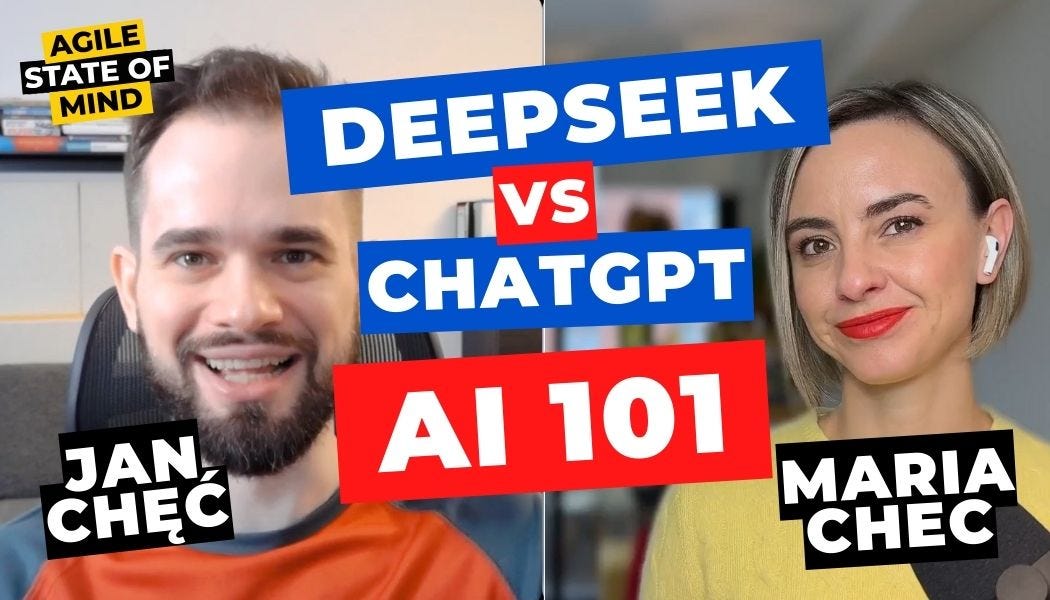DeepSeek’s Revolution
DeepSeek has burst onto the AI scene like a tsunami. While Silicon Valley is still trying to process the impact, this small Chinese AI lab has completely shaken up the playing field.
'DeepSeek grabbed headlines in late January with its R1 AI model, which the company says can roughly match the performance of Open AI’s o1 model at a fraction of the cost.’
CNN Business
What does this mean for the future of AI? Are we witnessing a turning point that will democratize access to advanced models? Let’s break it down.
AI 101
For this episode, I sat down with Jan Chęć—Backend Lead at SmartPatient, and my brother—who is deeply passionate about AI and integrates it into both his coding and daily life.
We kick things off by discussing DeepSeek and the massive shockwave it sent through the industry. The impact was so significant that Nvidia’s stock plunged 17%, wiping out nearly $600 billion in market value—the largest single-day market cap loss in U.S. history.
Then, we take a step back to clear up some of the AI buzzwords floating around. With so much jargon in the air, I wanted to break it all down. We explore the key differences between Generative AI (GenAI), Large Language Models (LLMs), and Agentic AI. We also dive into the four phases of AI evolution, as outlined by Nvidia’s CEO, Jensen Huang:
Perception AI
Generative AI
Agentic AI
Physical (Embodied) AI
And finally, we come to a simple conclusion: there’s no present—or future—without AI. If you’re not already on board, so you better hop on this train.
To help you do that, we share how we use the most powerful AI tools today, from ChatGPT, DeepSeek, and Claude.AI to developer-focused tools like Cursor IDE, GitHub Copilot, and more.
🔥 An episode you don’t want to miss! Plus, if you subscribe, I’ll send you a PDF neatly summarizing the key AI concepts you need to know.
The DeepSeek Difference
When DeepSeek burst onto the AI scene, it brought something different to the table – transparency in its thinking process.
"It shows you how it thinks."
Jan explains during our conversation.
"It writes to you like an expert trying to figure out your query and answering you the best way."
Unlike other AI tools that operate as black boxes, DeepSeek lets you peek behind the curtain. You can watch it parse your question, plan its approach, and even catch misunderstandings before they happen.
"You can see, OK, it misinterpreted my word, so I better stop it and rewrite the prompt," Jan notes, highlighting how this transparency leads to more efficient interactions.
What makes DeepSeek particularly notable is its approach to research. While other AI assistants might skim the surface, DeepSeek goes deep. In one instance, Jan recounts how it "checked 49 pages to compose a really good answer" – a level of thoroughness impractical for most humans.
This comprehensive approach, combined with its free availability - it’s available at zero cost - has made it a go-to tool for developers like Jan. To manage the platform availability, Jan wrote a script:
"I even wrote myself a script to automatically retry every three minutes, if it is overloaded. Because sometimes I don't need the answer right away, but I want to have the answer from this AI."
The AI Toolkit You Didn't Know You Needed
The conversation reveals a fascinating landscape of AI tools beyond the usual suspects:
Claude.Ai excels at processing documents and technical writing
Cursor IDE integrates AI directly into coding workflows
DeepSeek offers powerful research capabilities for free, apparently more powerful than Perplexity
GitHub Copilot assists with code completion and documentation
But it's not just about having more tools – it's about understanding their strengths and limitations. Also understanding how fast the world is changing:
"To search the internet, I almost don't use Google anymore."
Jan Chęć
Leadership Over Management
One of the most intriguing parts of our discussion centered on the leadership vs management part.
"In the future, we will have more focus on leadership because you will have your set of people, artificial people that can work for you," Jan predicts.
This suggests that you will need the traits typical for a leader like creating strategy, setting goals, and delegating work. You want to tell people (and robots) the strategy and let them find the tactics.
Traditional management, like middle management, will be easier to replace. It sounds like it’s a place for AI to shine.
The Limitations
Perhaps the most valuable insight from our conversation was about AI's limitations. When dealing with complex problems, Jan explains how AI often "addresses some aspects of the problem while ignoring others."
This technical limitation has important implications for how we integrate AI into our work. AI still struggles to break down complex tasks into smaller, manageable ones. It tends to get lost in complexity, providing only partial or oversimplified answers. If you want a truly reliable solution, you need to handle the complexity yourself—decomposing the problem into simpler parts before feeding it to AI.
The bottom line? AI, for all its power, still can’t match the human brain’s ability to navigate complexity efficiently.
What's Next?
The evolution from current generative AI to agentic AI (which can take autonomous actions) and eventually to physical AI (robotics) isn't as straightforward – or as threatening – as popular media might suggest. As Jan points out, each step faces significant technical and practical challenges, from exponential complexity to energy constraints.
Personally, I consider that the world won’t be recognizable in two year’s time. As you will appreciate in the conversation, Jan’s view of the future is more optimistic.
The Takeaway
Our conversation offers a unique perspective on AI that's both practical and forward-looking. Whether you're a developer, team leader, or just someone trying to understand where technology is heading, there's something here for you.
Want to hear more about how AI is transforming tech work, including practical tips and future predictions? Listen to the full episode at mariachec.substack.com, where we dive deeper into:
How to effectively use AI in development workflows
The future of programming in an AI world
Practical strategies for staying relevant in tech
Real-world examples of AI integration in development teams
This conversation is part of our ongoing series exploring the intersection of technology, agile development, and the future of work.
Check out more episodes and subscribe to my newsletter!












